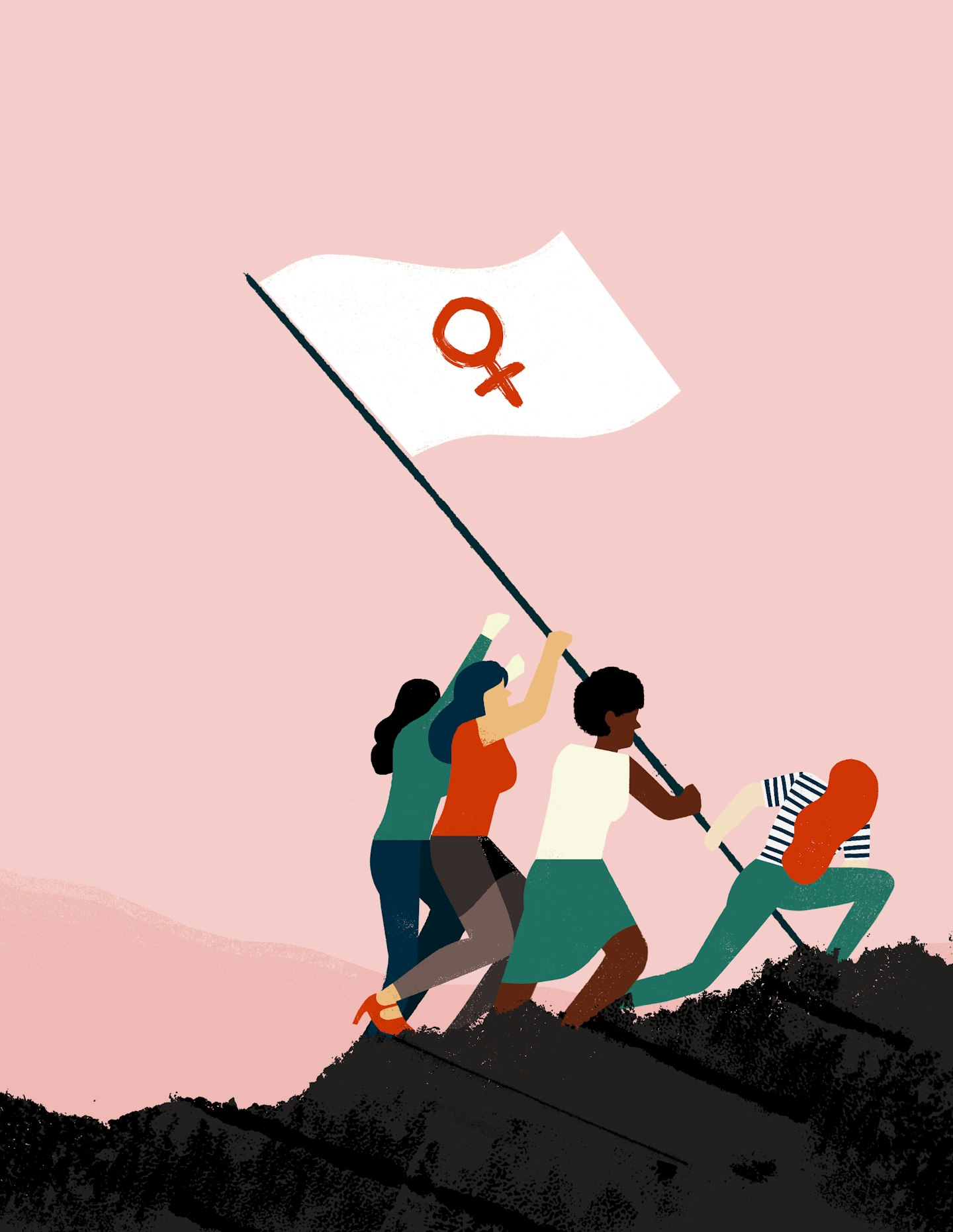It’s Equal Pay Day - the day of the year where women effectively begin working for free because of the pay gay. The pay gap is a complicated bit of economics, and while it’s true that women do earn less than men for a variety of reasons, it’s important to look at the specifics within the pay gap. One of the biggest pay gaps isn’t just between men and women, it’s between white men and WOC, or between men and women who have children. Working mothers earn on average 20% less than working fathers - even ten years after their child is born.
So perhaps it’s no surprise that women are suffering from what we’re calling the glass stopper. The glass stopper is the phenomenon where women hold off on having children until they’ve reached the zenith of their career because they don’t expect to be promoted or get a pay rise once they have children, especially if they work flexibly, from home or part time.
Workplaces are doing better than they once did. Pregnancy is a protected characteristic and does, at least in theory, come with legal indemnity. High level companies like banks and law firms have made an increased effort in the past decade to address their gender imbalance by being more supportive of working mothers. But as we see from the tiny number of women running FTSE350 companies, it’s not really working.
Despite knowing that while there will be a job to return to, and that often adjustments will be made to allow them to work flexibly, women are finding that their status as a mother will prevent them from climbing any further up the ranks. It’s hard to smash the glass ceiling when you’re stuck on the second floor.
Kate, 37, works in banking. She tells Grazia Daily, ‘it’s a well known policy amongst the women I know that you work like hell until your mid thirties to get promotion after promotion, and then as soon as you get to a level that you’re comfortable at, you can get pregnant. The male dominated places that I’ve worked are obsessed with retaining women, so after you have a baby they’re super flexible. Part time working, working from home, it’s all on the cards. They’ll never fire you, no matter how many nativity plays and sports days you take time off for. But they’ll also never promote you.’
Olivia, 35, is a lawyer. She tells a similar story. ‘My mentor took me to lunch and told me to freeze my eggs. She said that if I don’t make partner before I have a baby, and ideally allow people around me to assume I don’t want kids, then I probably wouldn’t make partner at all. So, I’m pulling 18 hour days and telling my husband that the second I make partner we’ll start trying for a baby. My biological clock is screaming, but I want to be a partner and a mum, and this feels like the only way that will happen. If I got pregnant now I would still have a job, they’d pay me well for my maternity leave and I’d be able to work here as long as I wanted. But I know my chances of promotion would be tiny. They’ll never say that they see maternity leave as a “year off”. But they do.’
Admittedly the glass stopper relates most of all to women in professional jobs, and is most noticeable in male dominated companies. If you’re working a zero hours contract where you’ll lose your job for needing time off and paid maternity leave is a fantasy, then the idea of being able to return to the role that you had before probably sounds pretty cushy. But the fact is, for as long as fatherhood makes men do better in their careers and motherhood makes women do worse, we’re never going to close the pay gap.
We spoke to HR expert Gemma Dale, who told Grazia Daily: ‘There is a range of evidence that suggests women who work flexibly suffer from a range of negative outcomes; they experience stigma (sometimes called ‘flexism’) and career marginalisation. Research suggest that many people believe that flexible workers are less committed or motivated, although there is no evidence to support these myths. In fact, research from the University of Manchester found that employees who work flexibly often have greater levels of commitment and willingness to ‘give back’ to their organisations and flexible arrangements can therefore in fact work as a motivator.
So, what are you supposed to do if your workplace has a culture of retaining but not promoting women after they have children? Gemma Dale says: ‘The question of what women can do about this is complex – the issues are systemic, structural and societal. They reflect a range of stereotypes and unconscious bias, deep rooted in gender stereotypes. They are also part of organisational culture in many businesses. Should women have to ‘prove’ that they are still committed, motivated or willing to progress? Can they even do so against the weight of these myths and barriers?
‘I would argue it is organisations that need to do better. Women and mothers are a vital part of organisational talent – their role as mothers does not negate this, nor mean that they are less committed, motivated or productive. Organisations can choose to work on this through in many ways – including effective flexible working strategies, manager / leader training and innovative policies. Allowing women’s careers to stagnate is a complete waste of talent. To those women who find themselves in these organisations, I would advocate leaving and working somewhere that is more focused on the talent of their people. These organisations are out there!’
If leaving a company which doesn’t value isn’t an option, you could consider speaking to your HR department and making them aware of the tendency to retain but not promote women who have children and/or work flexibly. Also, there is power in numbers. Connecting with other women in your workplace, sharing your concerns and creating internal mentoring can help to offset the prejudice that comes with being a working mother.
It’s a cliche to put the word ‘glass’ in front of an object and then describe why or how it impedes women’s progress in the world. But unfortunately, cliches are cliches because they are true. And in terms of female progress in the workplace, the glass stopper is a very real phenomenon.
17 Reasons Why The Gender Pay Gap Exists - Grazia
 1 of 17
1 of 171. Cost of childcare
For many couples, the cost of childcare in the UK is prohibitively expensive; in the sense that it prohibits women from going back to work. A friend of mine, a graduate and a mother of two living outside London, realised that were she to go back to work, once you took the cost of childcare for both her children away from her salary, she would earn a grand total of £20 a week. When confronted with the cost of nurseries, childminders, nannies etc it usually makes most sense for the person on the lower income to give up work, for a time, and look after children themselves. That, as we will see, is often the woman, which then perpetuates any income disparity that existed before they had children. Never mind the fact that in the UK, eligible partners are entitled, after the first two weeks from birth, to take the rest of the 52 weeks of leave (up to a maximum of 50 weeks) as Shared Parental Leave (SPL) or take the rest of the 39 weeks of pay (up to a maximum of 37 weeks) as Statutory Shared Parental Pay (ShPP). Never mind the fact that for non-breastfeeding mothers all caring can be shared or undertaken by a father or partners. Never mind that a child is almost always created by, and therefore the responsibility of, two parents. Thanks to the government attitude towards funding social welfare (as in, they'd rather allow enormous tax breaks for millionaires than fund any social welfare) childcare in Britain is simply too expensive to allow both parents to raise their family.
 2 of 17
2 of 172. Gendered language of recruitment
The language of recruitment is often, almost unconsciously, gendered in a way that discriminates against women. According to The Economist, research in Canada has compared reactions to ads for the same jobs that used stereotypically masculine words (leader, competitive and so on) or feminine ones (such as support, interpersonal and understand): 'Women found the "masculine" jobs less appealing, but not because they felt they would be unable to do them. They read the words as a signal of a male-dominated workplace, where they would not belong'. As one female neuroscientist friend put it to me, recruitment is structured to reify whatever aspects of STEM culture were and are prevalent, which historically has always been the reserve of white men of privilege. According to her, "it's the ultimate tautology": we think 'our science environment is like this, so this must be good for science' even when that environment doesn't work for a huge swathe of people, most notably the the BME and female scientists.
 3 of 17
3 of 173. Women in low-paid, unskilled work
According to the Office for National Statistics, more women still tend to work in occupations that offer lower salaries than men. Administrative and secretarial work, care work, customer services, cleaning. In short, the old picture is true; while the bosses in the offices may be older white men, the people actually doing the hard, unremarkable, undervalued drudge work of cooking, cleaning, standing at a shop counter, typing, answering the phone, wiping bums and brushing teeth will be women.
 4 of 17
4 of 174. Fear of getting sacked
For many women employed under short term or zero hour contracts, the fear of losing work outweighs the desire to challenge unfair practices. You may well suspect you are being paid less than your male counterparts but without the support of trade unions (55% of today's workforce in Britain has never been in a union) and the confidence of knowing you'll be able to pay your rent next month, it takes a brave person indeed to mount a challenge.
 5 of 17
5 of 175. Antisocial work culture
For many women employed under short term or zero hour contracts, the fear of losing work outweighs the desire to challenge unfair practices. You may well suspect you are being paid less than your male counterparts but without the support of trade unions (55% of today's workforce in Britain has never been in a union) and the confidence of knowing you'll be able to pay your rent next month, it takes a brave person indeed to mount a challenge.
 6 of 17
6 of 176. Male-dominated graduate schemes
Despite women's performance at higher education, graduate schemes are unfairly dominated by men. According to an AGR survey from 2016 of leading employers, while 54% of students are women, they make up just 47% of graduate scheme applicants. So, even though women have the qualifications, a disproportionate amount of graduate jobs ie. the well paid, high status ones, go to men.
 7 of 17
7 of 177. Men getting all the credit
Get a group of working women together - give them the time and space to share and reflect on their experiences, and a consensus will eventually be reached: men's achievements are viewed, subjectively, as of greater value than women's. Not just at work (how many 'stay at home mothers' are congratulated for their remarkable sacrifice? Or women lauded for the fact that they have made dinner?) but very noticeably at work nonetheless. It is simply too often the case that when two employees are involved in collaborative or equal work, the man will still be unfairly awarded for his achievements. It is the patriarchy's clever little confirmation bias running under everything we do: men are the best because we view them as the best and therefore award them the best allowing them to be the best. According to Citizens Advice Bureau, in order to bring a claim of sexual discrimination to an employment tribunal you would have to: compare yourself to someone of the opposite sex who works for the same employer as you and to be able to show that you: are doing like work; are doing work which has been rated as equivalent to the other person's under a job evaluation study; are doing work which is of equal value to that of the other person. This, of course, is easier said than done when, so often, men get promoted above their female colleagues, get a wider range of professional development opportunities or training, are credited for work that is not theirs and are evaluated subjectively and unfairly.
 8 of 17
8 of 178. Nobody wants to hire a 34-year-old assistant
I still remember the day I explained to my boss that I needed to get above the level of assistant editor before I turned 30 because, if I were to ever take time off work to have children, I needed to have already proved my chops. Therefore he needed to promote me now, or I would have to move somewhere else that would. As I put it, 'nobody wants to hire a 34-year-old assistant'. I can still remember the look on his face, the slow dawning of something fundamental before he replied "Oh, now you say that, I think that's what my wife is trying to do at the moment too."
 9 of 17
9 of 179. Gender conditioning
It is still, unfortunately, the case that the way girls are conditioned leads them away from the well paid world of STEM subjects. A love for science, technology, engineering and maths blossoms when children are encouraged to play with puzzles, shapes, counting games and construction toys like Lego. Little girls, as any trip to a toy shop or nursery will show you, are still pointed towards soft toys, cooking, dolls and princess shit. When we see people working in laboratories, in space, with robots, with coding and at universities that look like us, we want to do it. Sadly, for too long, the people doing those jobs have been white, middle-class men. As one female neuroscientist put it to me: 'The gap in the industry, especially tech, is partly driven by bad stereotypes about how men are just inherently better at stuff - at coding for instance - and this probably influences who gets credit for group projects, who gets put up for promotions etc. Fundamentally, we have designed a 'neutral' and 'objective' environment for science to be practiced but really there are just words that hide that we've created extremely toxic environments in which only white men thrive.'
 10 of 17
10 of 1710. The ‘Do They Look Like Me’ approach to senior leadership
The very people who are in charge of recruitment often lack the diversity necessary to create a diverse workforce. I'm sure all of us can remember, at some point, being interviewed by an all-white, all-male panel, either for a job, a promotion, an award, funding or other opportunity. While men disproportionately make up senior leadership in most industries, recruitment is always going to suffer by the sheer narrowness of the field. We could call this the 'Do they look like me?' approach to recruitment and promotion. People are simply far less likely to recognise and award achievement that differs from their own subjective, restricted view based on their own personal achievements.
 11 of 17
11 of 1711. Women still tend to be our carers
Although it is illegal to be discriminated at work because of caring responsibilities, women are nevertheless shut out of paid work because in the majority of cases they are the ones caring for a child, an elderly or disabled adult, while men 'go out to work'. The reasons for this are complicated and ancient; we do not value caring as work (even though it clearly is); we are conditioned to see women as the more caring sex, we encourage girls to play with dolls, to hold babies, to enact domestic roleplay. We tell them they are kind, nurturing, gentle, while pointing boys towards trucks, lego, robots, maths games, fighting and superheroes. No wonder, when the time comes for someone to look after the soft and helpless it's women who step up to the breach.
 12 of 17
12 of 1712. The Old Boys Network
Let's not be silly and pretend this doesn't exist. Male privilege isn't like ghosts - it's not a story we tell to scare ourselves. Male privilege isn't like toothache - we can't simply ignore it in the hope it goes away. Male privilege is like cancer - it is real, self-perpetuating and wholly destructive. The fact is that, across all well-paid jobs, industries and offices, men who went to school together, knew each other at university, played football together or went out drinking together will help each other out at work later on. Just look at the cabinet where 34% of Teresa May's senior ministers were privately educated and 48% went to Oxbridge [https://www.tes.com/news/school-news/breaking-news/theresa-mays-reshuffle-increases-proportion-privately-educated]. Until women are afforded the same opportunities - a support network of well-appointment and well-positioned contacts, places at the 'best' schools, being welcomed into previously men-only social, sports and drinking clubs - we will never have a level playing field. I don't want an Old Girl's Network, I don't want women-only golf courses or an Eton for girls. Best, all round, to simply get rid of this shit and create a truly egalitarian society where money, race and gender cannot buy you privilege.
 13 of 17
13 of 1713. The Motherhood Penalty
Hell, let's call it what it is. A recent American study put the motherhood penalty—the average by which women's future wages fall—at 4% per child, and 10% for the highest-earning, most skilled white women [https://www.ncbi.nlm.nih.gov/pmc/articles/PMC4041155/]. If you have a baby - if you decide to carry on the human race - your career will suffer. You will lose months of earning, you may want to work part time while your children are young, if you are breastfeeding then most jobs will still be entirely impractical until your child has weaned, you will need time to physically recover from birth, you will be less likely to put up with the kind of bullshit that keeps people in offices until 9pm. Even though, as we all know, working mothers are probably more efficient and more hardworking that their colleagues - you cannot keep an entirely helpless human being alive for a year without learning at least a little about multi-tasking and hard graft.
 14 of 17
14 of 1714. The promotion myth
It was long said that women didn't get promoted simply because they didn't put themselves up for promotion. This has never quite rung true to me and, I'm happy to say, it has been proved untrue. A survey by McKinsey in 2016 found that women in corporate America asked for promotion at the same rate as men. However, at the lower rungs of the career ladder, women were not promoted at the same rate as men, possibly because managers are reluctant to promote women who are starting families, or are likely to do so soon. It is possible that, in fact, women miss out on promotions for far more insidious reasons than just not asking; women do not self-promote in the same way as men; men are often credited for collaborative or others' work; imposter syndrome; women still feel less secure at work than men and therefore are less likely to leave a job even if it is stunting their career progression; the disproportionate amount of women working in low skilled or low paid jobs that offer little to no chance to promotion; many men still dislike being told what to do by a woman and so are reluctant to promote them to positions of senior leadership.
 15 of 17
15 of 1715. Locker room networking
Who among us hasn't worked somewhere where the men all play football together? What, I wonder, is the equivalent for women? Where is the extra curricular space for female colleagues to act and feel part of a team? To spend time doing something together that is collaborative, fun, social and not work?
 16 of 17
16 of 1716. Bonus culture
In banking and finance, bonus gaps of more than 60% were not uncommon. When huge amounts of money can be awarded on an entirely subjective and unregulated premise, it becomes all too easy for white men to benefit from confirmation bias - for rich white men to reward other rich white men for behaving like and benefiting themselves.
 17 of 17
17 of 1717. Squeamishness
We need to get better at talking about money. A lot better. I have been more comfortable asking colleagues about their bowel movements, sex lives, scars and dysfunctional families than what they earn. Until we know what other people doing like work are earning, we will not have the tools to tackle unfair pay. If you want to earn the same as the men in your workplace then you're going to have to find out what those men are earning. That may well mean asking them. If not them, then that may well mean asking your boss. Either way it's going to mean asking. When it comes to closing the gender pay gap there is much work to be done: supporting women in our industries, confronting misogyny, creating opportunities outside of the traditional, patriarchal workplace structures, allowing each other flexible work by demanding flexible work for ourselves, working hard and publicising our achievements, supporting the sisterhood. But all this will mean nothing if we don't follow it up with the big one, the tricky one, the bomb under the fatberg: asking for more money. Of course this is tricky when your work feels insecure, it goes against our conditioning to play nice and keep quiet, it forces awkward conversations and involves genuine risk. But the only way we'll get equal pay - just like equal healthcare, equal opportunity and equal status - is to demand it. For ourselves and others. Ask for more money. The #PayMeToo movement is a great starting point to give you ideas on how. Now it's up to you to put it into action. Words and deeds. Good luck and get going.
